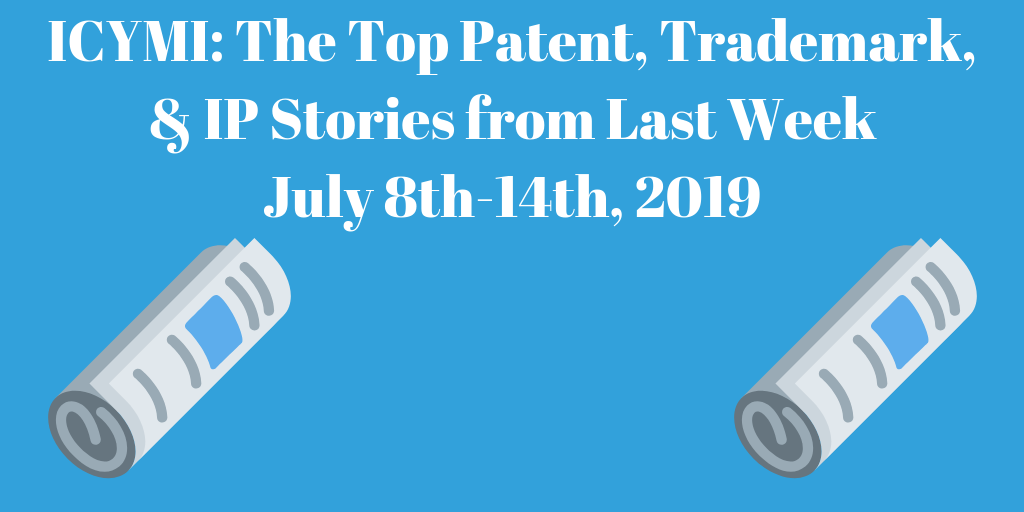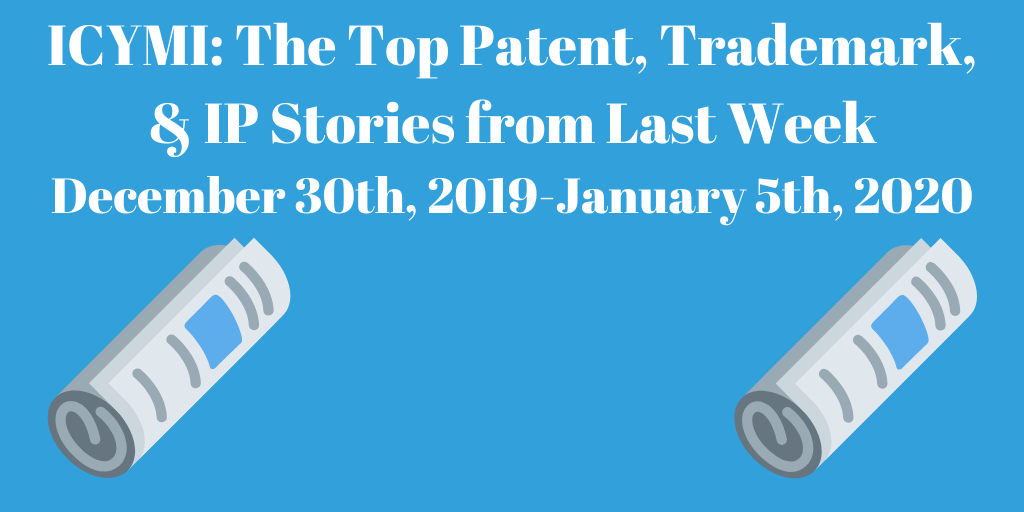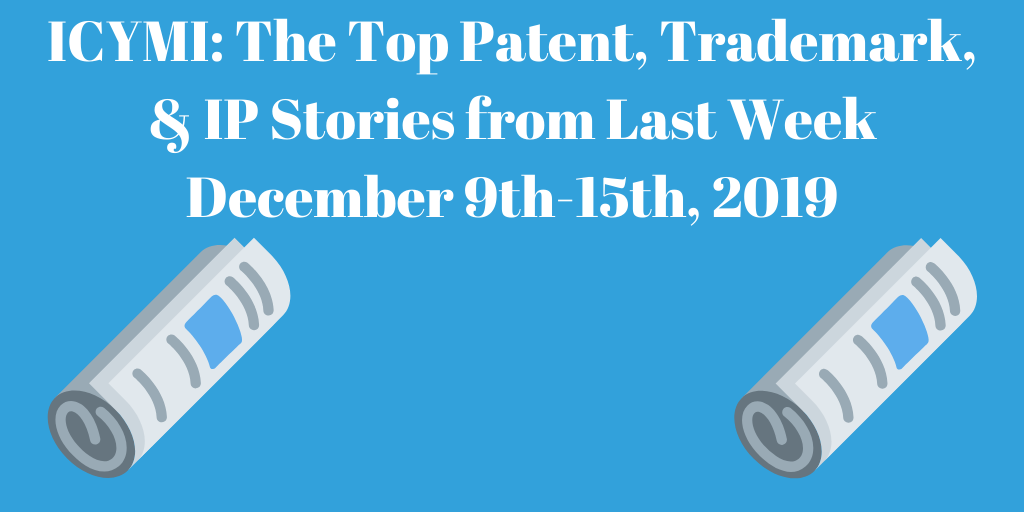Top Patent, Trademark, and IP Stories from Last Week (7/8-7/14/19)
Every week, we will be highlighting the top patent, copyright, trademark, intellectual property, etc. stories of the previous week in our “In Case You Missed It” segment. The list itself is in no particular order and includes a wide range of stories from the patent world that are informative, noteworthy, or just plain bizarre. The stories included encompass everything from Supreme Court cases to insights into growing industries. Please feel free to comment your thoughts on the stories or share an important one we missed!
“Supreme Court to Decide Two Trademark Cases”
The Supreme Court will decide two trademark cases, Romag Fasteners Inc. v. Fossil Inc. and Lucky Brand Dungarees v. Marcel Fashion Group after granting certiorari in recent weeks. In Romag Fasteners, the Court will decide whether proof of willful infringement is necessary in order to award an infringement victim.The case stems from an agreement between magnetic fastener manufacturer Romag Fasteners and Fossil in the 2000’s for the use of fasteners in handbags. In 2010, Romag found Fossil had used counterfeit fasteners using Romag’s trademark. Romag sued for trademark infringement however the jury found that although Fossil was guilty of infringement, they did not do so willfully. The almost $7 million in damages awarded by the jury to Romag were refused by the district court who decided there must be willfulness on behalf of the infringer to award them.
In Lucky Brand Dungarees, the Court will decide whether “when a plaintiff asserts new claims, federal preclusion principles can bar a defendant from raising defenses that were not actually litigated and resolved in any prior case between the parties.” The case arises from a dispute between clothing rivals Lucky Brand and Marcel Fashion Group in which Lucky Brand infringed on Marcel’s “Get Lucky” trademark by using “Lucky” on their clothes. The two reached a settlement in 2003 however a conflict now arises as the settlement was for previous infringement claims, not future ones.
When Marcel filed another lawsuit against Lucky in 2011, Lucky argued the claims were precluded (res judicata). The Second Circuit did not agree and eventually vacated, acknowledging claims preclusion applicability. There is no set date on either case. To read more about this story, click here (via JD Supra, July 8th, 2019).
“Lawmakers Renew Bill to Help Patent Owners Fight Challenges”
On July 10th, Sen. Chris Coons and Rep. Steve Stivers reintroduced the STRONGER Patents Act of 2019 aka “Support Technology & Research for Our Nation’s Growth and Economic Resilience (STRONGER) Patents Act” aka “H.R. 3666.” The bill is a re-introduction of the STRONGER Patents Act of 2015 & STRONGER Patents Act of 2017 which sought to “strengthen the position of the United States as the world’s leading innovator by amending title 35, United States Code, to protect the property rights of the inventors that grow the country’s economy.” Both were introduced to the Senate but never proceeded from there.
The proposed bill aims to protect American innovators and their inventions. An interesting part of the bill includes that funders of patent validity challenges cannot file a separate challenge on that same patent they funded. Also, the bill seeks to clarify a lot of ambiguous USPTO guidelines including when patent board decisions can be appealed. Given the bill barely moved in Congress the past two times it was introduced, there is little doubt this becomes a bill. Something to keep an eye on regardless. To read more about this story, click here (via Bloomberg Law, July 10th, 2019).
“IBM Patents a Smartwatch That Transforms Into a Giant Awkward Tablet Screen on Your Wrist”
Foldable smartphone screens are all the rage lately, transforming otherwise tiny electronic devices into miniature tablets and laptops. As manufacturers race to put their products on the marketplace, the technology has stumbled a bit out the gate. For example, the first foldable phone released, the Samsung Galaxy Fold, has already been dubbed a “disaster.” This has not stopped IBM from filing a patent for a foldable smartwatch with “variable display size” however.
When worn, the smartwatch’s face would expand into a 2×2 screen square display. This would display items such as news feeds, weather, etc. depending on user preference, From there, the screens could expand even further to 4×2 screens. This would be possible by sliding mechanisms on each screen where each screen would also store behind one another for seamless expansion. To go one step further, IBM hopes to meet consumers’ needs by allowing them to add or remove screens and further expand the display to their desired size.

The patent claims such versatility could accommodate the user who may need to multitask without the necessity of carrying a tablet or laptop. Although such technology is feasible given current foldable products on the market, whether it is practical is yet to be seen. To read more about this story, click here (via Gizmodo, July 9th, 2019).
“Lyft Wants to Patent a ‘Driver Jukebox’ That Could Let You Play Music During Your Ride”
Ride-sharing company Lyft has recently filed a patent for what it calls a “driver jukebox system.” Originally filed in 2015, the system would allow riders in a Lyft car to select from a predetermined playlist of songs, artists, or albums created by the driver. Essentially, the system would play songs tailored to the shared music preferences of both the driver and rider. In 2016, rival Uber launched a partnership with Pandora and Spotify to give riders the ability to control the music in their rides dubbed the “Rider Music” program.

Lyft claims the current status quo is “limited” given the driver is in control of the car’s music environment. Even if the driver attempts to play different songs to make the ride enjoyable, all occupants of the vehicle must experience the same music environment “regardless of their own music preferences.” By giving riders the ability to select music curated by the driver before and during the ride, all parties will be able to enjoy the music during the ride. To read more about this story, click here (via Business Insider, July 9th, 2019).
ICYMI: “USPTO Announces New Trademark Rule Requiring Foreign-Domiciled Applicants and Registrants to Have a U.S.-Licensed Attorney”
Back in February we discussed how the USPTO was proposing a new policy that foreign applicants must be represented by a U.S.-licensed attorney. On July 2nd, the USPTO announced they would go ahead with the policy, setting an effective date of August 3, 2019 for its implementation. Qualified U.S.-licensed attorneys must provide their address name, postal address, email address, and bar membership/standing in order to prove they are acting in good faith when submitting applications.Additionally, Canadian patent attorneys will not be able to represent Canadian applicants.
The campaign stems from a USPTO that has been overrun by inaccurate and fraudulent foreign applications over the past few years. This measure aims to put less burden on patent examiners and enhance the quality of patents submitted to the office. To read more about this story, click here (via USPTO, July 2nd, 2019)




